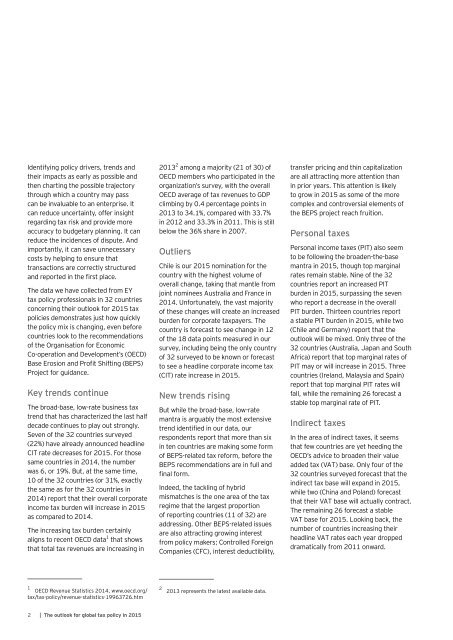ey-global-tax-policy-outlook-for-2015
ey-global-tax-policy-outlook-for-2015
ey-global-tax-policy-outlook-for-2015
You also want an ePaper? Increase the reach of your titles
YUMPU automatically turns print PDFs into web optimized ePapers that Google loves.
Identifying <strong>policy</strong> drivers, trends and<br />
their impacts as early as possible and<br />
then charting the possible trajectory<br />
through which a country may pass<br />
can be invaluable to an enterprise. It<br />
can reduce uncertainty, offer insight<br />
regarding <strong>tax</strong> risk and provide more<br />
accuracy to budgetary planning. It can<br />
reduce the incidences of dispute. And<br />
importantly, it can save unnecessary<br />
costs by helping to ensure that<br />
transactions are correctly structured<br />
<br />
The data we have collected from EY<br />
<strong>tax</strong> <strong>policy</strong> professionals in 32 countries<br />
concerning their <strong>outlook</strong> <strong>for</strong> <strong>2015</strong> <strong>tax</strong><br />
policies demonstrates just how quickly<br />
the <strong>policy</strong> mix is changing, even be<strong>for</strong>e<br />
countries look to the recommendations<br />
<br />
<br />
<br />
Project <strong>for</strong> guidance.<br />
K<strong>ey</strong> trends continue<br />
The broad-base, low-rate business <strong>tax</strong><br />
trend that has characterized the last half<br />
decade continues to play out strongly.<br />
Seven of the 32 countries surv<strong>ey</strong>ed<br />
(22%) have already announced headline<br />
CIT rate decreases <strong>for</strong> <strong>2015</strong>. For those<br />
same countries in 2014, the number<br />
was 6, or 19%. But, at the same time,<br />
10 of the 32 countries (or 31%, exactly<br />
the same as <strong>for</strong> the 32 countries in<br />
2014) report that their overall corporate<br />
income <strong>tax</strong> burden will increase in <strong>2015</strong><br />
as compared to 2014.<br />
The increasing <strong>tax</strong> burden certainly<br />
1 that shows<br />
that total <strong>tax</strong> revenues are increasing in<br />
2013 2 among a majority (21 of 30) of<br />
<br />
organization’s surv<strong>ey</strong>, with the overall<br />
<br />
climbing by 0.4 percentage points in<br />
2013 to 34.1%, compared with 33.7%<br />
in 2012 and 33.3% in 2011. This is still<br />
below the 36% share in 2007.<br />
Outliers<br />
Chile is our <strong>2015</strong> nomination <strong>for</strong> the<br />
country with the highest volume of<br />
overall change, taking that mantle from<br />
joint nominees Australia and France in<br />
2014. Un<strong>for</strong>tunately, the vast majority<br />
of these changes will create an increased<br />
burden <strong>for</strong> corporate <strong>tax</strong>payers. The<br />
country is <strong>for</strong>ecast to see change in 12<br />
of the 18 data points measured in our<br />
surv<strong>ey</strong>, including being the only country<br />
of 32 surv<strong>ey</strong>ed to be known or <strong>for</strong>ecast<br />
to see a headline corporate income <strong>tax</strong><br />
(CIT) rate increase in <strong>2015</strong>.<br />
New trends rising<br />
But while the broad-base, low-rate<br />
mantra is arguably the most extensive<br />
<br />
respondents report that more than six<br />
in ten countries are making some <strong>for</strong>m<br />
of BEPS-related <strong>tax</strong> re<strong>for</strong>m, be<strong>for</strong>e the<br />
BEPS recommendations are in full and<br />
<br />
Indeed, the tackling of hybrid<br />
mismatches is the one area of the <strong>tax</strong><br />
regime that the largest proportion<br />
of reporting countries (11 of 32) are<br />
<br />
are also attracting growing interest<br />
from <strong>policy</strong> makers; Controlled Foreign<br />
Companies (CFC), interest deductibility,<br />
transfer pricing and thin capitalization<br />
are all attracting more attention than<br />
in prior years. This attention is likely<br />
to grow in <strong>2015</strong> as some of the more<br />
complex and controversial elements of<br />
the BEPS project reach fruition.<br />
Personal <strong>tax</strong>es<br />
Personal income <strong>tax</strong>es (PIT) also seem<br />
to be following the broaden-the-base<br />
mantra in <strong>2015</strong>, though top marginal<br />
rates remain stable. Nine of the 32<br />
countries report an increased PIT<br />
burden in <strong>2015</strong>, surpassing the seven<br />
who report a decrease in the overall<br />
PIT burden. Thirteen countries report<br />
a stable PIT burden in <strong>2015</strong>, while two<br />
<br />
<br />
32 countries (Australia, Japan and South<br />
Africa) report that top marginal rates of<br />
PIT may or will increase in <strong>2015</strong>. Three<br />
countries (Ireland, Malaysia and Spain)<br />
report that top marginal PIT rates will<br />
fall, while the remaining 26 <strong>for</strong>ecast a<br />
stable top marginal rate of PIT.<br />
Indirect <strong>tax</strong>es<br />
In the area of indirect <strong>tax</strong>es, it seems<br />
that few countries are yet heeding the<br />
<br />
<br />
32 countries surv<strong>ey</strong>ed <strong>for</strong>ecast that the<br />
indirect <strong>tax</strong> base will expand in <strong>2015</strong>,<br />
while two (China and Poland) <strong>for</strong>ecast<br />
that their VAT base will actually contract.<br />
The remaining 26 <strong>for</strong>ecast a stable<br />
VAT base <strong>for</strong> <strong>2015</strong>. Looking back, the<br />
number of countries increasing their<br />
headline VAT rates each year dropped<br />
dramatically from 2011 onward.<br />
1<br />
<br />
<br />
2<br />
2013 represents the latest available data.<br />
2 | The <strong>outlook</strong> <strong>for</strong> <strong>global</strong> <strong>tax</strong> <strong>policy</strong> in <strong>2015</strong>




